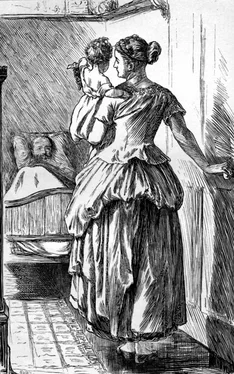Elizabeth Gaskell - Six Weeks at Heppenheim
Здесь есть возможность читать онлайн «Elizabeth Gaskell - Six Weeks at Heppenheim» весь текст электронной книги совершенно бесплатно (целиком полную версию без сокращений). В некоторых случаях можно слушать аудио, скачать через торрент в формате fb2 и присутствует краткое содержание. Год выпуска: 2004, ISBN: 2004, Издательство: Kessinger Publishing, Жанр: Классическая проза, на английском языке. Описание произведения, (предисловие) а так же отзывы посетителей доступны на портале библиотеки ЛибКат.
- Название:Six Weeks at Heppenheim
- Автор:
- Издательство:Kessinger Publishing
- Жанр:
- Год:2004
- ISBN:9781161452822
- Рейтинг книги:5 / 5. Голосов: 1
-
Избранное:Добавить в избранное
- Отзывы:
-
Ваша оценка:
- 100
- 1
- 2
- 3
- 4
- 5
Six Weeks at Heppenheim: краткое содержание, описание и аннотация
Предлагаем к чтению аннотацию, описание, краткое содержание или предисловие (зависит от того, что написал сам автор книги «Six Weeks at Heppenheim»). Если вы не нашли необходимую информацию о книге — напишите в комментариях, мы постараемся отыскать её.
Six Weeks at Heppenheim — читать онлайн бесплатно полную книгу (весь текст) целиком
Ниже представлен текст книги, разбитый по страницам. Система сохранения места последней прочитанной страницы, позволяет с удобством читать онлайн бесплатно книгу «Six Weeks at Heppenheim», без необходимости каждый раз заново искать на чём Вы остановились. Поставьте закладку, и сможете в любой момент перейти на страницу, на которой закончили чтение.
Интервал:
Закладка:
SIX WEEKS AT HEPPENHEIM
BY ELIZABETH GASKELL
After I left Oxford, I determined to spend some months in travel before settling down in life. My father had left me a few thousands, the income arising from which would be enough to provide for all the necessary requirements of a lawyer's education; such as lodgings in a quiet part of London, fees and payment to the distinguished barrister with whom I was to read; but there would be small surplus left over for luxuries or amusements; and as I was rather in debt on leaving college, since I had forestalled my income, and the expenses of my travelling would have to be defrayed out of my capital, I determined that they should not exceed fifty pounds. As long as that sum would last me I would remain abroad; when it was spent my holiday should be over, and I would return and settle down somewhere in the neighbourhood of Russell Square, in order to be near Mr. — 's chambers in Lincoln's-inn. I had to wait in London for one day while my passport was being made out, and I went to examine the streets in which I purposed to live; I had picked them out, from studying a map, as desirable; and so they were, if judged entirely by my reason; but their aspect was very depressing to one country-bred, and just fresh from the beautiful street-architecture of Oxford. The thought of living in such a monotonous gray district for years made me all the more anxious to prolong my holiday by all the economy which could eke out my fifty pounds. I thought I could make it last for one hundred days at least. I was a good walker, and had no very luxurious tastes in the matter of accommodation or food; I had as fair a knowledge of German and French as any untravelled Englishman can have; and I resolved to avoid expensive hotels such as my own countrymen frequented.
I have stated this much about myself to explain how I fell in with the little story that I am going to record, but with which I had not much to do, — my part in it being little more than that of a sympathizing spectator. I had been through France into Switzerland, where I had gone beyond my strength in the way of walking, and I was on my way home, when one evening I came to the village of Heppenheim, on the Berg-Strasse. I had strolled about the dirty town of Worms all morning, and dined in a filthy hotel; and after that I had crossed the Rhine, and walked through Lorsch to Heppenheim. I was unnaturally tired and languid as I dragged myself up the rough-paved and irregular village street to the inn recommended to me. It was a large building, with a green court before it. A cross-looking but scrupulously clean hostess received me, and showed me into a large room with a dinner-table in it, which, though it might have accommodated thirty or forty guests, only stretched down half the length of the eating-room. There were windows at each end of the room; two looked to the front of the house, on which the evening shadows had already fallen; the opposite two were partly doors, opening into a large garden full of trained fruit-trees and beds of vegetables, amongst which rose-bushes and other flowers seemed to grow by permission, not by original intention. There was a stove at each end of the room, which, I suspect, had originally been divided into two. The door by which I had entered was exactly in the middle, and opposite to it was another, leading to a great bed-chamber, which my hostess showed me as my sleeping quarters for the night.
If the place had been much less clean and inviting, I should have remained there; I was almost surprised myself at my vis inertiæ; once seated in the last warm rays of the slanting sun by the garden window, I was disinclined to move, or even to speak. My hostess had taken my orders as to my evening meal, and had left me. The sun went down, and I grew shivery. The vast room looked cold and bare; the darkness brought out shadows that perplexed me, because I could not fully make out the objects that produced them after dazzling my eyes by gazing out into the crimson light.
Some one came in; it was the maiden to prepare for my supper. She began to lay the cloth at one end of the large table. There was a smaller one close by me. I mustered up my voice, which seemed a little as if it was getting beyond my control, and called to her,—
"Will you let me have my supper here on this table?"
She came near; the light fell on her while I was in shadow. She was a tall young woman, with a fine strong figure, a pleasant face, expressive of goodness and sense, and with a good deal of comeliness about it, too, although the fair complexion was bronzed and reddened by weather, so as to have lost much of its delicacy, and the features, as I had afterwards opportunity enough of observing, were anything but regular. She had white teeth, however, and well-opened blue eyes—grave-looking eyes which had shed tears for past sorrow—plenty of light-brown hair, rather elaborately plaited, and fastened up by two great silver pins. That was all—perhaps more than all—I noticed that first night. She began to lay the cloth where I had directed. A shiver passed over me: she looked at me, and then said,—
"The gentleman is cold: shall I light the stove?"
Something vexed me—I am not usually so impatient: it was the coming-on of serious illness—I did not like to be noticed so closely; I believed that food would restore me, and I did not want to have my meal delayed, as I feared it might be by the lighting of the stove; and most of all I was feverishly annoyed by movement. I answered sharply and abruptly,—
"No; bring supper quickly; that is all I want."
Her quiet, sad eyes met mine for a moment; but I saw no change in their expression, as if I had vexed her by my rudeness: her countenance did not for an instant lose its look of patient sense, and that is pretty nearly all I can remember of Thekla that first evening at Heppenheim.
I suppose I ate my supper, or tried to do so, at any rate; and I must have gone to bed, for days after I became conscious of lying there, weak as a new-born babe, and with a sense of past pain in all my weary limbs. As is the case in recovering from fever, one does not care to connect facts, much less to reason upon them; so how I came to be lying in that strange bed, in that large, half-furnished room; in what house that room was; in what town, in what country, I did not take the trouble to recal. It was of much more consequence to me then to discover what was the well-known herb that gave the scent to the clean, coarse sheets in which I lay. Gradually I extended my observations, always confining myself to the present. I must have been well cared-for by some one, and that lately, too, for the window was shaded, so as to prevent the morning sun from coming in upon the bed; there was the crackling of fresh wood in the great white china stove, which must have been newly replenished within a short time.
By-and-by the door opened slowly. I cannot tell why, but my impulse was to shut my eyes as if I were still asleep. But I could see through my apparently closed eyelids. In came, walking on tip-toe, with a slow care that defeated its object, two men. The first was aged from thirty to forty, in the dress of a Black Forest peasant, — old-fashioned coat and knee-breeches of strong blue cloth, but of a thoroughly good quality; he was followed by an older man, whose dress, of more pretension as to cut and colour (it was all black), was, nevertheless, as I had often the opportunity of observing afterwards, worn threadbare.
Their first sentences, in whispered German, told me who they were: the landlord of the inn where I was lying a helpless log, and the village doctor who had been called in. The latter felt my pulse, and nodded his head repeatedly in approbation. I had instinctively known that I was getting better, and hardly cared for this confirmation; but it seemed to give the truest pleasure to the landlord, who shook the hand of the doctor, in a pantomime expressive of as much thankfulness as if I had been his brother. Some low-spoken remarks were made, and then some question was asked, to which, apparently, my host was unable to reply. He left the room, and in a minute or two returned, followed by Thekla, who was questioned by the doctor, and replied with a quiet clearness, showing how carefully the details of my illness had been observed by her. Then she left the room, and, as if every minute had served to restore to my brain its power of combining facts, I was suddenly prompted to open my eyes, and ask in the best German I could muster what day of the month it was; not that I clearly remembered the date of my arrival at Heppenheim, but I knew it was about the beginning of September.
Читать дальшеИнтервал:
Закладка:
Похожие книги на «Six Weeks at Heppenheim»
Представляем Вашему вниманию похожие книги на «Six Weeks at Heppenheim» списком для выбора. Мы отобрали схожую по названию и смыслу литературу в надежде предоставить читателям больше вариантов отыскать новые, интересные, ещё непрочитанные произведения.
Обсуждение, отзывы о книге «Six Weeks at Heppenheim» и просто собственные мнения читателей. Оставьте ваши комментарии, напишите, что Вы думаете о произведении, его смысле или главных героях. Укажите что конкретно понравилось, а что нет, и почему Вы так считаете.












